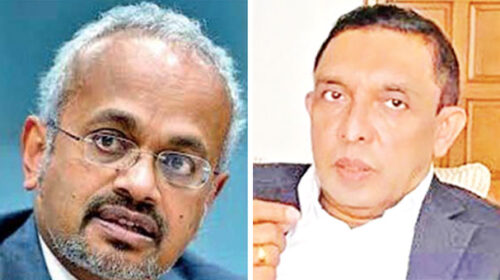‘IMF has spoken diplomatically about minimising corruption in Sri Lanka’
Public appeal for economic reforms at an all-time high : economist
By Sanath Nanayakkare
 It is time for Sri Lanka to make a series of economic decisions with important consequences, and making state owned enterprises (SOEs) directly accountable to the people rather than politicians is key among them, Shanta Devarajan, a professor of the Practice of Development at Georgetown University said on Saturday .
It is time for Sri Lanka to make a series of economic decisions with important consequences, and making state owned enterprises (SOEs) directly accountable to the people rather than politicians is key among them, Shanta Devarajan, a professor of the Practice of Development at Georgetown University said on Saturday .
“Economic reforms in Sri Lanka used to be a solitary concern weighing on the mind of the International Monetary fund (IMF) in the past. But today it is interesting to note that Aragalaya, the government, politicians and even the general public agreeing on the critical need for reforms in making public entities and the entire economic system be made accountable to the people rather than politicians”, he said.
“For example, the Samurdhi movement was designed to eliminate poverty in Sri Lanka, mainly through the inclusion of low-income households and the provision of resources to support economic improvement, but it ended up turning into a vote-spinning mechanism to benefit politicians. And the loss- making SOEs such as the CPC, CEB, Sri Lankan Airlines landed on their dismal performance over the past decades because they were accountable to only politicians who kept them financing with public money without creating the right policies and a business model to get them running on their own cash flow without becoming a burden to the public. However, today that perception has changed notably after the public protests spilled out on to the streets through Aragalaya – the unprecedented people’s movement that clamoured for ‘system change’. It was obvious that their struggle was to push and force the decision makers to introduce new reforms to bring an end to the ‘elite capture’ of resources at the expenses of the poor people.”
“Sri Lanka will not limit borrowing if it can have access to borrowing funds from China or India whose debt will have a political element than a business case. It is a lot better if Sri Lanka can raise funds from the international capital market because then the government will be held accountable to make repayments subject to conditions. In the context of ISBs, the government will have to consistently demonstrate its creditworthiness, low country risk, manageable fluctuations in exchange rate and that the borrowed funds will be used wisely and it won’t be stolen.”
Shanta Devarajan made these remarks at the virtual monthly economic seminar organized by the Sri Lanka Economic Association (SLEA) on ‘’Economic Reforms in Sri Lanka and ‘Aragalaya’ .
When asked during the Q&A whether IMF wouldn’t push Sri Lanka to eliminate corruption, he said,” The IMF has said that to Sri Lanka in a polite way. The Aragalaya’ fight against pervasive corruption at elite level has also been a concern for the IMF and they have conveyed it to the government through ‘diplomatic language’. Today everyone is on the same page.”
Sirimal Abeyratne, Professor in Economics, University of Colombo who moderated the panel discussion quipped at this point saying if efforts are made at all levels to eliminate corruption in Sri Lanka, the public sector could even launch a general strike.